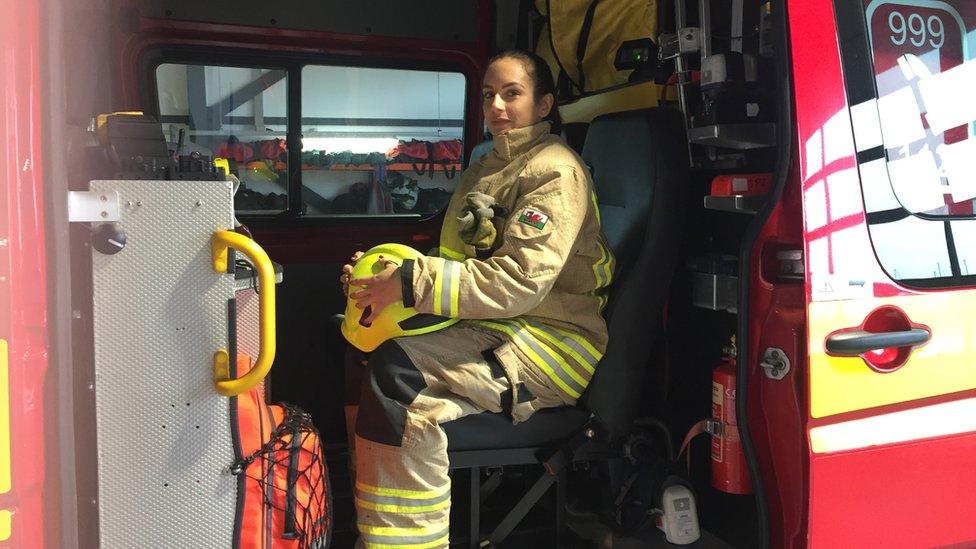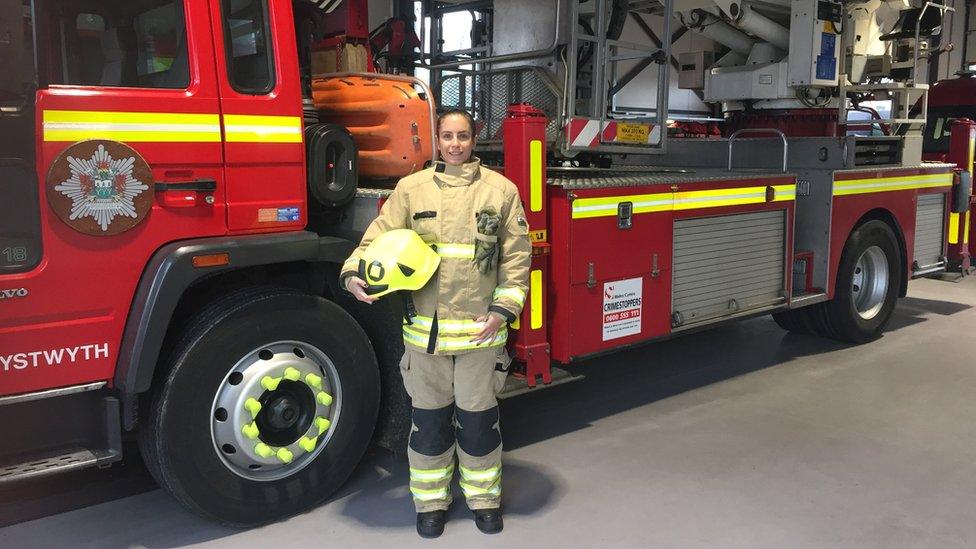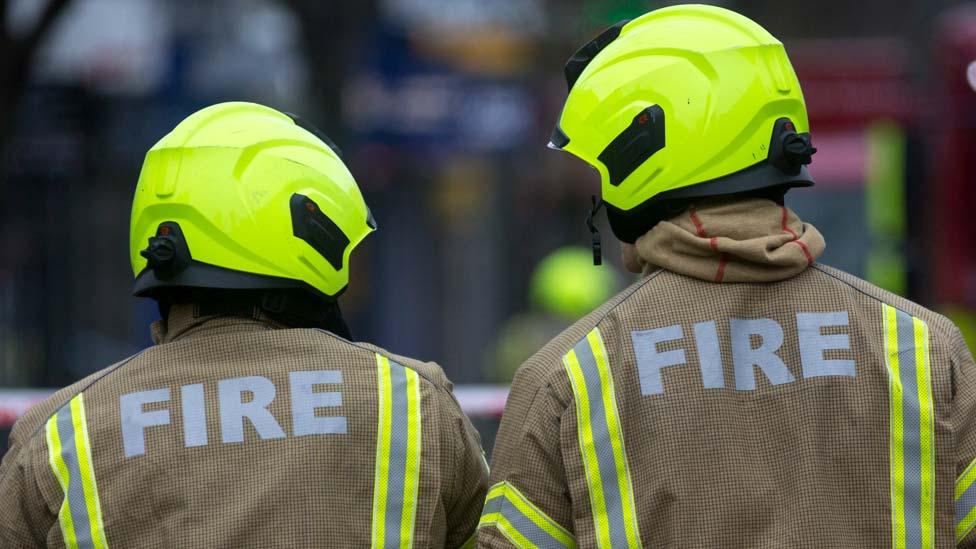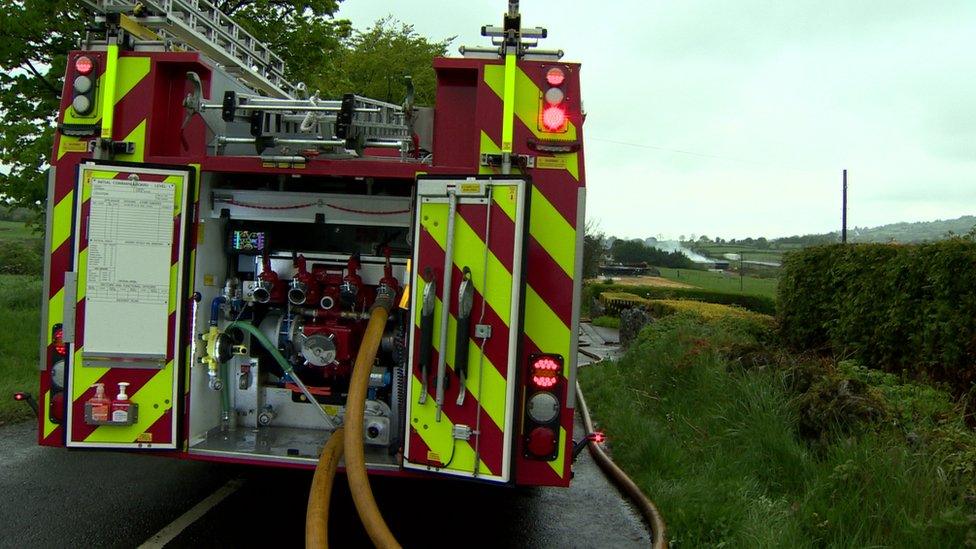On-call firefighter recruitment 'more and more difficult'
- Published

Cara Nisbet is allowed to leave her council job if she is called out by the fire service
Recruiting on-call firefighters is becoming "more and more difficult", a community safety manager has said.
Retainer staff - who man more than 70% of Wales' fire stations - need to be able to leave their main jobs the moment they are needed and are usually on call 120 hours a week.
But Kevin Jones of North Wales Fire and Rescue Service said fewer people now work in small communities.
"It's a challenge but one we have got to overcome," he said.
Mr Jones worked as an on-call firefighter for five years at the beginning of his career while he was self-employed, before becoming a full-time member of staff.
'We've got to be smarter'
But on-call firefighters need to live or work within a few minutes of a retained station - meaning the increase in people commuting to larger towns and cities for work is reducing the pool of people able to sign up.
They also need to be able to leave that job or their home as soon as they are called.
"It's got more and more difficult, there's no doubt, over the last 10 to 15 years less people work in small communities - this is a challenge across the whole of the UK.
"We've just got to be smarter about what who we approach and understand if people can offer a small amount of hours then we'll look at that individual, we'll look at each case individually, it's a challenge but one we have got to overcome."
The majority of North Wales' stations are staffed by on-call firefighters - 35 of its 45 - but Mr Jones stressed there is currently no danger of any closing despite the recruitment challenges.
"We haven't closed any [stations] in north Wales, and we've no intention to do that," he said.
"We intend to do our utmost to ensure they are staffed."
"It's an opportunity to make a huge difference to your life, and get involved with things you just wouldn't do without joining a service, and it's so diverse.
"You could be fitting a smoke detector one day, attending a chemical incident the next and on a school visit the next, every day is so different.
"It will change you as a person, I don't know anybody who's joined and hasn't liked it."

Who is doing the job?

Cara Nisbet has been an on-call firefighter for 18 months
Cara Nisbet, 34, works for Ceredigion council - which allows her to leave work at any time if she is paged by Mid and West Wales Fire and Rescue Service.
She said she was overweight and smoking and drinking too much when she decided to take control of her life, get fit and become a firefighter.
"It's inspirational being part of something like this," Cara said.
"Anyone considering it, I'd say try it. I never thought I would be able to do something like this.
"I never went to the gym, I was unfit and overweight and partying a lot and then I grew up and thought, 'what am I going to do?'
"I got fit, quit smoking, joined a gym, joined the fire service and I've never looked back."
Ms Nisbet has been an on-call firefighter with the station in Aberystwyth for 18 months, and while being on call for 120 hours a week is tough she can book two days off a week and feels this is enough to enable her to have a life away from the service.
"For me it's rewarding and it's opened a lot of doors, I'm getting my HGV licence to drive a fire engine, and learning all the time.
"The danger element might put people off, I'm not really anxious about it, dealing with death worries me more and would I get over it, especially the death of a child, it's bad enough when it's an adult.
"I have dealt with one death... It's a blur and I can't remember what I did, I still didn't feel 100% after a week. There is counselling available, there's support.
"But your pager goes off and you don't know what it's going to be until you get here [to the station]."
Retained firefighters are paid to be on call along with payments for call-outs, even if they are stood down before they arrive at the station.

What is the situation across Wales?
In South Wales on-call firefighters make up about one third of the operational workforce, with 27 of its 47 stations exclusively manned by on-call staff. A further nine stations have both on-call and wholetime firefighters.
The service said it is continually recruiting for on-call firefighters, and the service has "changed considerably" over the last few years - with the role of the the firefighter "adapting to reflect this and to meet the demands from the local community".
It said the modern firefighter still responds to fires, crashes, flooding and other emergencies - but is also able to switch to a more preventative role, involving educating the community on keeping safe.
"A career in the fire service is exciting, challenging, varied and rewarding, where you can make a real difference," a spokeswoman said.
In mid Wales, 45 of 58 stations are manned by volunteers and on-call firefighters, who need to live a maximum of 10 minutes away. The service is currently recruiting on-call staff for all but 11 of its stations.
Kevin Jones, assistant chief officer at Mid and West Wales Fire and Rescue Service, said on-call firefighters are a "vital part of the emergency services network and come from all walks of life".
"They have often chosen a career outside of the fire service, but also wish to serve their community as a firefighter."
- Published17 December 2019

- Published5 September 2019
